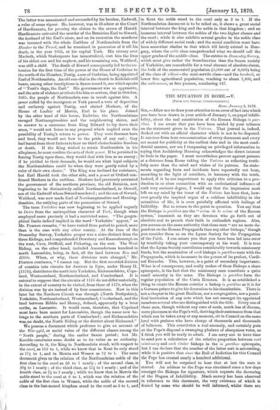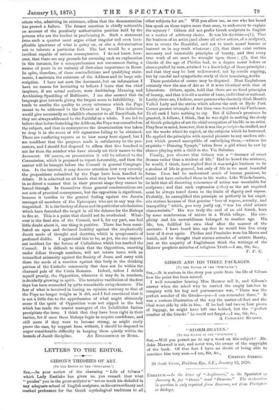Rome, January 8, 1870. Six, —Allow m e to draw your
attention to an error of fact into which you have been drawn in your article of January 1, on papal infalli- bility, about the real constitution of the Roman Bishops is par- ables. I am aware that you have been misled by your reliance on the statement given in the Vatican. That journal is, indeed, decked out with an official character which is not to be disputed. It receives from here communication of every document and every act meant for publicity at the earliest date and in the most confi- dential manner, nor am I trespassing on privileged information in saying that Archbishop Manning acknowledges the direct interest he feels in the paper. I must nevertheless protest against persons at a distance from Rome taking the Vatican as reflecting truth- fully more than the mind and wishes of its patrons. Its state- ments regarding facts and incidents have repeatedly not been, according to the light of outsiders, in harmony with the truth. Indeed, if it be not impertinent to apply this criticism to a pro- duction in so close connection with an ecclesiastical influence of such very eminent degree, I would say that the impression most left on my mind by the tenor of the Vatican has been that, how- ever greatly the inspired organ of a sublime infallibility in the actualities of life, it is even painfully affected with failings of fallibility. But to return to the point in question. You say that the Bishops in parables are the " creme de la creme of the Roman system," inasmuch as they are devotees who go forth out of absolute zeal to preach their faith in outlandish regions. Also, you assume on the same authority that these men " are no more de- pendent on the Roman Propaganda than any other bishops," though you consider them so on the Lyons Society for the Propagation of the Faith. I can assure you that you have been led into error by trustfully taking your contemporary at his word. It is true that the Lyons Society contributes considerably towards missionary funds, but the nomination of such bishops in partibus rests with the Propaganda, which is incarnate in the person of its prefect, Cardi- nal Barnabo. This, however, is a point of secondary importance. IV hat is of consequence, and really makes of these Bishops a sham episcopate, is the fact that the missionary ones constitute a quite small minority in the mass. The Bishops in partibus form the regular population of the Curia Romans. It is as established a thing to create the Roman courtier a bishop in partibus as it is for a German prince to give his decoration to his chamberlain. There is not a chapter in the great Basilicas, nor a congregation, nor a ponti- fical institution of any note which has not amongst its appointed members several who are distinguished with the title. Every one of these men, though without any cure of souls, much less of, diocese, mere placemen at the Pope's will, deriving their sustenance from that which can be taken away at any moment, sit in Council on the same level with prelates who have charge of thousands and thousands of believers. This constitutes a real anomaly, and certainly puts at the Pope's disposal a swamping phalanx of obsequious votes, as I think you will be ready to admit. I am sorry not to have time to send you a calculation of the relative proportion between real missionary and such titular bishops in the in parables episcopate, but I can declare that the number of the latter sort is astounding, while it is positive that since the Bull of Indiction for this Council the Pope has created nearly a hundred additional.
You will not be surprised to hear that at last the nare is started. An address to the Pope was circulated since a few days amongst the Bishops for signature, which requests the decreeing of the Dogma of Infallibility. Much secrecy has been observed in reference to this document, the very existence of which is denied by some who should be well informed, whilst there are others who, admitting its existence, affirm that the demonstration has proved a failure. The former assertion is chiefly noticeable on account of the peculiarly authoritative position held by the persons who are the loudest in proclaiming it. Such a statement from such a quarter must argue either singular and even inex- plicable ignorance of what is going on, or else a determination not to tolerate a particular fact. The last would be a grave incident capable of serious consequences. I do not know, how- ever, that there are any grounds for assuming such an explanation in this instance, for a misapprehension not uncommon during a course of years in an embassy of first-class importance in Rome. in spite, therefore, of these contradictions and qualifying state- ments, I maintain the existence of the Address and its large sub- scription. I have not seen the document, but on information I have no reason for hesitating to believe I learn that the chief inspirers, if not actual authors, were Archbishop Manning and Archbishop Spaulding of Baltimore. I am also assured that its language goes towards giving the largest sense to Infallibility. It tends to ascribe the quality to every utterance which the Pope meant to be addressed to the Church at large. This definition would give necessarily an infallible character to all Encyclicals, for they are always addressed to the Faithful as a whole. I am led to believe that before launching the Address, the Pope was consulted on the subject, and that in consequence the determination was taken to drop it iu the event of 400 signatures failing to be obtained. There are conflicting reports as to how many have signed, but I am confident that the progress made is satisfactory to the pro- moters, and I should feel disposed to affirm that five hundred is not far from the number who have already set their names to the document. Of course, on presentation it will be referred to the Commission, which is prepared to report favourably, and then the matter will be brought before the Council in general Congrega- tion. In the interval, it may deserve attention how very severely the propositions submitted by the Pope have been handled in debate. It is admitted on all hands that they have been attacked in so direct a manner that in their present shape they cannot be forced through. In themselves these general condemnations are not acts of practical consequence, but the opposition is significant, because it testifies to the general -feeling against the Jesuits amongst all members of the Episcopate who are in any way dis- tinguished. It is the Society of Jesus and its particular scholasticism which have furnished the target in all the debates for the Bishops to fire at. This is a point that should not be overlooked. What- ever is the final aim of the Council, and I, for my part, can feel little doubt about it, one thing is positive. There has been mani- fested an open and declared hostility against the emphatically Jesuit mode of thought and doctrine, which is symptomatic of profound dislike. I apprehend this to be, as yet, the one import. ant incident for the future of Catholicism which has marked the Council. It is difficult to think that the Opposition, smarting under defeat through numbers, will not return home with an intensified animosity against the Society of Jesus, and carry with them the seeds of a reaction against this body in the thinking portion of the Catholic community that does not lie within the charmed pale of the Curia Romana. Indeed, unless I delude myself greatly, the Opposition, whatever it may do in numbers, is decidedly growing in spirit. The tentative vacillation of the first days has been succeeded by quite remarkable outspokenness. The fear of what is involved in having an opinion contrary to that of the Pope no longer weighs as it did, and I feel convinced that it is not a little due to the apprehension of what might ultimately ensue if the spirit of Opposition were not nipped in the bud which has made the master managers of the Infallibilist faction precipitate the issue. I think that they have been right in their tactics, for if once these bishops begin to acquire confidence, and still more if they were to become strong, as might easily prove the case, by support from without, 1 should be disposed to augur considerable difficulty in keeping them quietly within the































 Previous page
Previous page